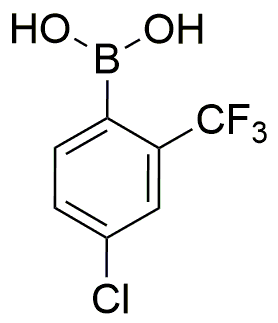4-Chloro-2-(trifluoromethyl)phenylboronic acid is widely utilized in research focused on:
- Organic Synthesis: This compound serves as a crucial building block in the synthesis of various pharmaceuticals and agrochemicals, allowing for the development of new drugs and crop protection agents.
- Cross-Coupling Reactions: It plays a significant role in Suzuki-Miyaura coupling reactions, which are essential for forming carbon-carbon bonds in complex organic molecules, streamlining the synthesis process in the pharmaceutical industry.
- Fluorinated Compounds: The trifluoromethyl group enhances the biological activity of compounds, making it valuable in the design of potent medicinal agents, particularly in oncology and infectious disease research.
- Material Science: This chemical is used in the development of advanced materials, including polymers and coatings, which benefit from its unique properties, such as increased thermal stability and chemical resistance.
- Analytical Chemistry: It serves as a reagent in various analytical techniques, aiding in the detection and quantification of other compounds, which is crucial for quality control in pharmaceuticals and environmental monitoring.
General Information
Properties
Safety and Regulations
Applications
4-Chloro-2-(trifluoromethyl)phenylboronic acid is widely utilized in research focused on:
- Organic Synthesis: This compound serves as a crucial building block in the synthesis of various pharmaceuticals and agrochemicals, allowing for the development of new drugs and crop protection agents.
- Cross-Coupling Reactions: It plays a significant role in Suzuki-Miyaura coupling reactions, which are essential for forming carbon-carbon bonds in complex organic molecules, streamlining the synthesis process in the pharmaceutical industry.
- Fluorinated Compounds: The trifluoromethyl group enhances the biological activity of compounds, making it valuable in the design of potent medicinal agents, particularly in oncology and infectious disease research.
- Material Science: This chemical is used in the development of advanced materials, including polymers and coatings, which benefit from its unique properties, such as increased thermal stability and chemical resistance.
- Analytical Chemistry: It serves as a reagent in various analytical techniques, aiding in the detection and quantification of other compounds, which is crucial for quality control in pharmaceuticals and environmental monitoring.
Documents
Safety Data Sheets (SDS)
The SDS provides comprehensive safety information on handling, storage, and disposal of the product.
Product Specification (PS)
The PS provides a comprehensive breakdown of the product’s properties, including chemical composition, physical state, purity, and storage requirements. It also details acceptable quality ranges and the product's intended applications.
Certificates of Analysis (COA)
Search for Certificates of Analysis (COA) by entering the products Lot Number. Lot and Batch Numbers can be found on a product’s label following the words ‘Lot’ or ‘Batch’.
*Catalog Number
*Lot Number
Certificates Of Origin (COO)
This COO confirms the country where the product was manufactured, and also details the materials and components used in it and whether it is derived from natural, synthetic, or other specific sources. This certificate may be required for customs, trade, and regulatory compliance.
*Catalog Number
*Lot Number
Safety Data Sheets (SDS)
The SDS provides comprehensive safety information on handling, storage, and disposal of the product.
DownloadProduct Specification (PS)
The PS provides a comprehensive breakdown of the product’s properties, including chemical composition, physical state, purity, and storage requirements. It also details acceptable quality ranges and the product's intended applications.
DownloadCertificates of Analysis (COA)
Search for Certificates of Analysis (COA) by entering the products Lot Number. Lot and Batch Numbers can be found on a product’s label following the words ‘Lot’ or ‘Batch’.
*Catalog Number
*Lot Number
Certificates Of Origin (COO)
This COO confirms the country where the product was manufactured, and also details the materials and components used in it and whether it is derived from natural, synthetic, or other specific sources. This certificate may be required for customs, trade, and regulatory compliance.


